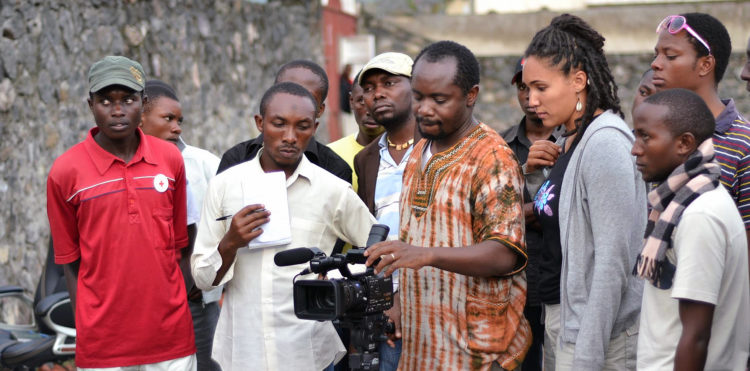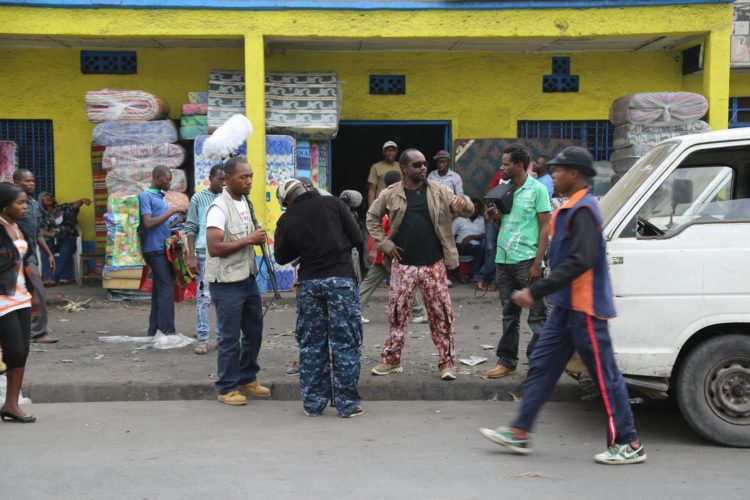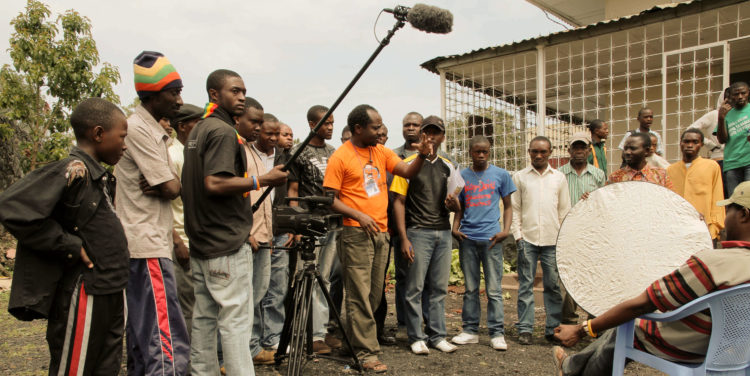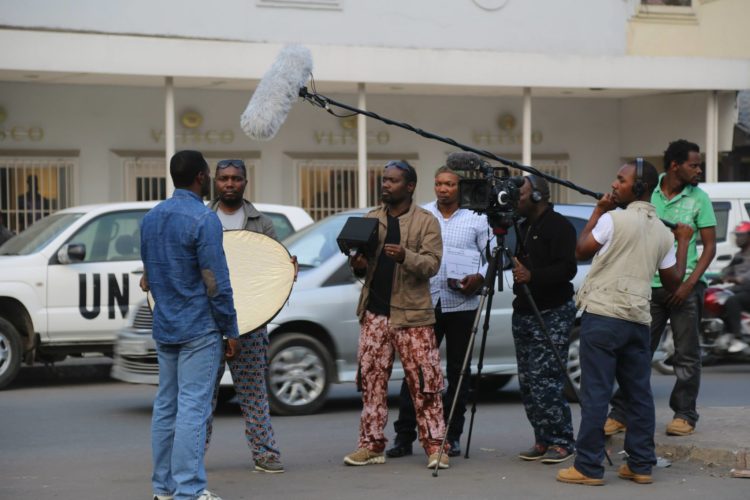Since 1996, the Democratic Republic of Congo (DRC) has been embroiled in violence that has killed as many as 6 million people. The conflict has been the world’s bloodiest since World War II. Many call it the ‘African World War.’ Now President Kabila’s third and final term (according to the constitution) is coming to an end on December 19, without elections or any sign of a successor.
But Petna Ndaliko, filmmaker, mentor, consultant and Founder of the Yole!Africa cultural centre and the Congo International Film Festival (CIFF) in Goma wants to shape a different narrative about the country through education and ‘cultivating local film culture’. He is best known for 2013’s Mabele Na Biso (Our Land), a portrait of a local community in the Isangi region in northern DRC, and a different take on the complex issue of international aid.
Independence is a theme which runs through his filmmaking. Frustrated about the state of democracy in his country, he wants power to return to the people. ‘As a nation we need to remember that our government officials are employees of the state and therefore the people have the right to fire them when they fail to respect the rules of democracy’.
But it’s not as easy as importing a system of representation from the West. ‘It is up to us, the people, to insist that we dissociate from the culture of “chiefdom” and respect democracy — but it must be the democracy that grows out of our culture and serves our needs, not the democracy imported from the West that is not even working there.’
When you have a repressive government in front of you, you need to be creative to find the courage to seize the future.
Born in 1974 and raised in Goma in eastern Congo on the border of Uganda, Ndaliko would see victims of Rwandan genocide trickling through his home. He remembers his mother offering food, clothing and shelter to the men and women and children who came through in tattered clothes, exhausted.
This image played on his mind for years and eventually he did something about it: his first play was called Victims of War. When war broke out in his Congo in 1996, he began his activism which eventually forced him to flee to Uganda the following year.
This activism powers his films. ‘When I make a film I am driven by both the content and the aesthetic; in my activism I prioritise methods that keep me close to the community,’ He focuses on ‘communication and mutual understanding… creative social change is the result of those two elements combined.’
Art, which is often considered ‘harmless’ by government forces, is actually a powerful way to engage communities.
In 2002, he started Yole!Africa. It was at a time where there were hardly any options for young people except to join—or run away from—armed groups. The aim of the hub is to offer an alternative that promotes education, creativity, critical thinking, and mutual respect among Goma youth, says Ndaliko. ‘Yole!Africa is a place where people from all different walks of life could come together and learn cooperatively to provide both a physical space and life skills that are alternatives to violence and war’.
Art, which is often considered ‘harmless’ by government forces, is actually a powerful way to engage communities. ‘When you have a repressive government in front of you, you need to be creative to find the courage to seize the future. In Congo we needed a more creative approach to activism.’ For him, the youth can channel their energies in worthy causes. ‘For me art provides space for a kind of activism that counteracts this kind of destruction, art can be a way of engaging disillusioned—sometimes violent— youth, teaching them to understand history from a different perspective, art can create safe space for critical thinking, which ultimate leads to informed action’.
In 2005, he founded the Salaam Kivu International Film Festival, the 10-day fair – renamed the Congo International Film Festival this year. Accompanying community discussions, workshops and presentations in poetry, storytelling and contemporary dance form a ‘sustainable strategy’ to ‘engage local communities in discovering their mission as agents of change.’
Change is vital, particularly in the political situation. For him, the Congolese people must move beyond personality politics. ‘I believe even if public opinion of president Kabila’s government was positive, people would still want him to relinquish power on the 19 of December 2016 as the constitution stipulates. On a psychological level it is important for people of Congo to witness a peaceful transition of power and finally have leaders who respect the rules and their own words.’
Women are targets because of their strength not because of their weakness.
In his documentary Jazz Mama, Petna vents his political anger through a 30-minute doc aimed at raising awareness of gender-based violence in Congo. He doesn’t turn the women into victims. He wants to show the agility, the endurance and the enterprising nature of women.
‘I wanted people to come out of the theatre energised after watching Jazz Mama. I wanted to make a film on sexual violence that captures the profound humanity of the people whose lives hang in the mix of geopolitics, a film that does not further our collective trauma but reminds us of our strength and shares that story with the world.’
‘Just as rape continues to be the cheapest weapon for multinational companies and their militias to destroy Congo and just as rape continues to be the topic that brands Congo in the global imagination as a “savage” nation, it continues to be important to tell the other side of the story, to convey the message that women are targets because of their strength not because of their weakness, the message that Congo itself is being raped for minerals everyday while the world stands by.’
Film can shake free the stereotypes imposed through slavery, colonization, and imperialism but is also a way to look forward.
The filmmaker is currently Artist in Residence at the Sonja Haynes Centre for Black Culture and History at the University of North Carolina at Chapel Hill. He is working on a number of projects including a piece on the extraordinary life and works of Congolese pianist and composer Ray Lema. Another film called Africatude is out in November 2017; it explores the complex relationship between Africans and various groups of African descent around the world. And he is also working on a portrait of Benkos Bioho, who escaped from the slave port of Cartagena in Colombia in the 16th century then established the maroon community of San Basilio de Palenque, which was first free village in the Americas.
So is there anything stopping him? ‘My biggest challenge is finding funding.’ It is a balance ‘between the content of the stories I want to tell and the aesthetic language I use to tell them.’ And this is central to his craft: ‘It is important to me to tell stories of daily life that complicate the overarching narrative of violence and depravity or the beauty of nature.’ And these stories are not just part of his activism but are also works of cinematic art.
Film can shake free the stereotypes imposed through slavery, colonization, and imperialism but is also a way to look forward. ‘From Cape Town to Kinshasa to Cairo, from Dakar to Nairobi,’ Ndaliko says, ‘filmmaking is necessary for liberating our memory and for questioning the unexpected future of continent.’
Find out more about Yole!Africa




